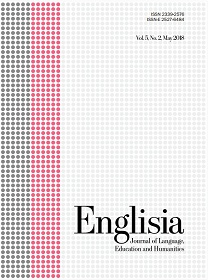Grammatical interference in Islamic school students’ English narrative writings
DOI:
https://doi.org/10.22373/ej.v11i1.18947Abstract
Employing a qualitative approach, this study aims to discover the types of grammatical interference that mostly occur in narrative texts written by Indonesian students at a senior high school level. The grammatical interference covered in this article is categorized into two, namely syntactical interference and morphological interference. Moreover, 20 eleventh-grader students of an Islamic school were chosen randomly to be the sample of this research. The students were asked to compose a narrative text with a topic that has been determined by the teacher. Their writings were then analyzed descriptively to find out the dominant types of grammatical interference made by the students. It was revealed that the students encountered morphological inferences related to tenses, articles, subject-plural forms, and pronouns. Besides, syntactical inferences regarding word order, noun phrase, and passive voice are found in the students’ writings. Thus, it implies that students often used the grammatical rules of their first language in composing their writings in English.
Downloads
References
Alharthi, S. (2021). From instructed writing to free-writing: A study of EFL learners. SAGE Open, 11(1). https://doi.org/10.1177/21582440211007112
Ardiantari, I. A. P. G. (2021). Revising syntactic interference on conversation scripts by contrastive analysis teaching method. Journal of English Teaching, Applied Linguistics and Literatures (JETALL), 8(1), 1–10.
Bhela, B. (1999). Native language interference in learning a second language: Exploratory case of native language interference with target language usage. International Education Journal, 1, 22–31.
Budiharto, R. A. (2019). Native language interference on target language writings of Indonesian EFL students: An exploratory case study. Indonesian EFL Journal, 5(1), 107–116. https://doi.org/10.25134/ieflj.v5i1.1630
Ekawati, P. A. (2018). Analysis of grammatical interferences in the oral communication presented by PIBBI participants. Jurnal Pendidikan Bahasa Dan Sastra, 18(1), 16–27. https://doi.org/10.17509/bs_jpbsp.v18i1.12143
Grabe, W., & Kaplan, R. B. (2014). Theory and practice of writing: An applied linguistic perspective. Routledge.
Hajar, I., Salija, K., & Muliati, A. (2019). The interference of Indonesian on the students’ English writing of Muhammadiyah University of Makassar.
Hans, A., & Hans, E. (2017). Role of grammar in communication–writing skills. International Journal of English Language, Literature and Humanities, 5(1), 39–50. https://doi.org/10.24113/ijellh.v5.issue1.42
Hikmah, D., Dzulqarnain, I. M., & Arifin, S. (2021). Grammatical interference in English communication used by Nurul Jadid students. Journal of Linguistics, 3(1).
Iman, T. R. (2020). The interference of Indonesian on English second language writing. Journal of Languages and Language Teaching, 8(2), 170–182. https://doi.org/10.33394/jollt.v%vi%i.2466
Irma, Jabu, B., & Salija, K. (2018). Interference of the students’ Indonesian Language in delivering English presentation.
Irmalia, M. (2016). Indonesian interference in students’ writing. English Education Journal (EEJ), 7(4), 496–508.
Latifa, N., & Manan, A. (2018). Teaching narrative text by using Preview, Question, Read, State, and Test (PQRST) technique. English Education Journal (EEJ), 9(2), 243–260.
Lopez, M. (2011). The motivational properties of emotions in foreign language learning. Colombian Applied Linguistics Journal, 43–57.
Miftah, Z. (2016). Increasing EFL students’ writing abilities using peer response activities via facebook. Indonesian EFL Journal: Journal of ELT, Linguistics, and Literature, 2(2), 1–27. http://ejournal.kopertais4.or.id/index.php/efi
Muliani, S., Norahmi, M., & Asi, N. (2019). The analysis of difficulties in writing narrative text. Linguistics, Literature and English Teaching Journal, 9(2), 112–132. http://jurnal.uin-antasari.ac.id/index.php
Muziatun, M., Bay, I. W., & Maryam, S. (2020). Morphological interference on student’s writing. Indonesian EFL Journal, 6(2), 189–196. https://doi.org/10.25134/ieflj.v6i2.3425
Oybek, Y., Abdazimov, A., Utkir, M., Umida, K., & Madina, M. (2021). Improving writing skills using communicative competence. International Journal of World Languages, 1(2). http://ejournals.id/index.php/IJWL/issue/archive
Pudiyono. (2012). Indonesian grammatical interference towards the students’ spoken and written English. International Journal for Educational Studies, 4(2), 229–244.
Purba, R. (2018). Improving the achievement on writing narrative text through discussion starter story technique. Advances in Language and Literary Studies, 9(1), 27–30. https://doi.org/10.7575/aiac.alls.v.9n.1p.27
Puspita. (2021). Error analysis of Indonesian grammatical interference in students’ English composition. Buletin Poltanesa, 22(1), 101–109. https://doi.org/10.51967/tanesa.v22i1.466
Rao, P. S. (2017). The characteristics of effective writing skills in English language teaching. Research Journal of English (RJOE), 2(2), 75–86. www.rjoe.org.inwww.rjoe.org.in
Sari, D. M. M. (2019). An error analysis on student’s translation text. Eralingua: Jurnal Pendidikan Bahasa Asing Dan Sastra, 3(2), 65–74. https://ojs.unm.ac.id/eralingua
Septiana, A. R. (2020). The indonesian grammatical interference on EFL students’ writing. Journal of Research on English and Language Learning (J-REaLL), 1(1), 46–52. https://doi.org/10.33474/j-reall.v1i1.5610
Sinaga, R. T. P. (2020). The students’ difficulties in writing a narrative text at grade ten of SMA Negeri 4 Pematangsiantar. Nommensen Journal of English Studies (NoJES), 1(1), 25–32.
Syarif, H. (2014). Grammatical interference patterns in the English departements students’ writing: Indonesia to English grammar. Elixir: International Journal, 68, 22647–22649.
Tarukallo, Y., Rita, F., & Usman, S. (2017). Syntactic interference in translating Indonesian narrative text into English for the students of English education study program at Tentena Christian University. Bahasantodea, 5(2), 43–53.
Weinrich, U. (1953). Language in contact: Finding and problem. Mounton Publisher.
Zakaria, M. A., & Aziz, A. A. (2019). The impact of digital storytelling on ESL narrative writing skill. Arab World English Journal (AWEJ), 5, 319–332. https://doi.org/10.24093/awej/call5.22
Downloads
Published
Issue
Section
License
Proposed Policy for Journals That Offer Open Access
Authors who publish with Englisia journal agree to the following terms:
- Authors retain copyright and grant the journal right of first publication with the work simultaneously licensed under a Creative Commons Attribution License that allows others to share the work with an acknowledgement of the work's authorship and initial publication in this journal.
- Authors are able to enter into separate, additional contractual arrangements for the non-exclusive distribution of the journal's published version of the work (e.g., post it to an institutional repository or publish it in a book), with an acknowledgement of its initial publication in this journal.
- Authors are permitted and encouraged to post their work online (e.g., in institutional repositories or on their website) prior to and during the submission process, as it can lead to productive exchanges, as well as earlier and greater citation of published work (See The Effect of Open Access).









